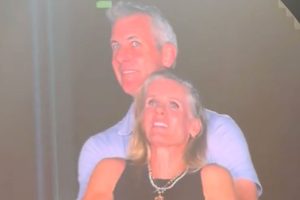A dazzling multimedia show at this year’s Ashkenaz Festival offers a new perspective on the archetypal femme fatale Salome, portraying her as one of the powerful matriarchs of Jewish history and celebrating her sexuality.
Salome: Woman of Valor, which had its world premiere at the Chutzpah Festival in Vancouver last March, comes to the Harbourfront Centre Theatre on Sept. 2. The spoken word opera features poetry, dance, music and trippy projected imagery.
The show’s text, by poet Adeena Karasick, a cultural theorist and spoken word artist, moves between poetry, midrash, Kabbalah and pop culture. She began writing the libretto five years ago, after Frank London, a Grammy Award-winning klezmer and world music artist, suggested they work on a project together.
“Working with Frank was an absolute dream. I would create a text and he would listen to it and create music to go with it, and we would go back and forth,” Karasick said over the telephone from New York. A Canadian, she teaches at the Pratt Institute there.
Karasick’s libretto is written from a Jewish feminist perspective. Through research, she discovered discrepancies between the stories about Salome in the Gospels – in which she asks for John the Baptist’s head as a reward for dancing for Herod – and the information about Salome in Jewish historical sources, the Jewish apocrypha and Josephus’ Jewish Antiquities. Neither the apocrypha nor Josephus recounts the grisly story, Karasick said.
READ: ASHKENAZ FESTIVAL TO CELEBRATE POLISH-JEWISH CULTURE
The Salome story many of us are familiar with was created by Oscar Wilde. His play about Salome is fake news from the 19th century, Karasick said. In it, Salome falls in love with John the Baptist, who’s executed because he rejects her. The play ends with the now iconic image of Salome holding John’s severed head and kissing it.
“Wilde created a myth. The problem with it is that it’s very derogatory to Jews and to women, showing that Salome is just another Christian murderer,” she said.
Karasick refashioned Salome, giving her a weight and a history and a context that befits Jewish royalty and a strong, powerful woman, she said.
“In my version, it becomes an incredible love story, where John the Baptist is in love with Salome as well. He has to make the very difficult decision, whether he wants to be with her, but being a saint, he’s also dedicated to his own spiritual journey. An ecstatic relationship ensues, even though Salome, in this rendition, ends up killing John the Baptist, as per his bidding.”
She added that Wilde presents Salome as a sexualized object. “She has to dance a very sexualized dance for her uncle in this really twisted story. In my version, she’s dancing for her uncle from a position of power,” Karasick said.
Although the Salome story dates back to the first century CE, Karasick’s version has a message for present-day audiences. “In light of the #MeToo movement and the problematic aspects of fake news, I think our show is hugely relevant at this moment because it’s speaking to both of those issues,” she said.
In the show, Karasick delivers the text in Hebrew, Yiddish and English, in a rolling, sing-chanting style. Dancers Rebecca Margolick and Jessie Zarit, who play the parts of Salome and John the Baptist, are responsible for much of the choreography. After experimenting with different styles of dance, they settled on modern jazz ballet.
London’s score for the show, for trumpet, keyboard and percussion, reflects his interest in avant-garde jazz and Middle Eastern and Indian music. Performed by London on trumpet, percussionist Deep Singh and keyboard player Shai Bachar, the music is a klezmer, bhangra and Middle Eastern mashup. Karasick’s libretto, published by Toronto’s Gap Riot Press, along with a dual translation in English and Italian with more information, put out by the University of Padova Press, will be on sale at Harbourfront.
For tickets to “Salome: Woman of Valor” on Sept. 2 at the Ashkenaz Festival,
visit ashkenaz.ca. The festival runs from Aug. 28 to Sept. 3.






